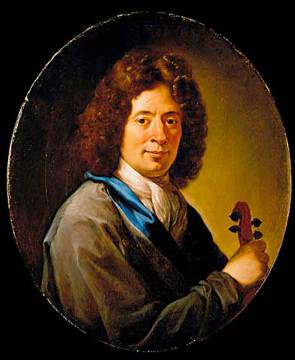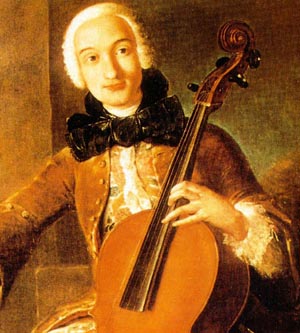February 13, 2012. Corelli and Boccherini. Arcangelo Corelli, the Italian Baroque composer and violinist, was born on February 17, 1653. During his lifetime Corelli was more famous as a violinist than composer. He had many pupils, among them Geminiani and Locatelli, who became famous themselves as composers and violinists. Corelli’s music for violin, while very melodic, was quite un-virtuosic and used only a limited range of the instrument. It was widely circulated and favored as suitable pieces for students. In a famous episode from 1708, it is said that Corelli refused to play a high altissimo A in a passage from the overture to Handel's oratorio The Triumph of Time and Truth. When Handel, at the time just 23 and 32 years younger than Corelli, played the note, Corelli took offence.
We’ll hear two pieces by the Corelli. First, Sonata in C Major, Op. 5, No. 3 performed by Rachel Barton Pine, violin, and David Schrader, harpsichord. Ms. Barton Pine plays a Nicola Gagliano violin from 1770, in original, unaltered condition. You can listen to it here. A very different recording was made by the Russian violinist Albert Markov in 1970. It is La Folia, arranged by Fritz Kreisler. Beautiful sound, rich and romantic, today may seem a bit dated. Still, it’s a pleasure to listen to (here). Dmitry Cogan is on the piano. We should note that La Folia (or folly) is one of the oldest recorded tunes in the history of European music. The first classical arrangement of it was written by Jean-Baptiste Lully in 1672. In addition to Corelli, the theme was used by Marin Marais, Alessandro Scarlatti, Antonio Vivaldi and many other composers (the site folias.nl is dedicated just to this music).
Luigi Boccherini, an Italian Classical composer, was born on February 19, 1743 in Lucca, Italy. Boccherini moved to Madrid around 1769 to become a music teacher to Infante Luis Antonio, younger brother of King Charles III. He enjoyed great popularity till, as the story goes, one day the King expressed his disapproval for a passage in a new trio, and ordered Boccherini to change it. Outraged, Boccherini doubled the passage instead, and was immediately dismissed. He stayed in Spain and eventually found other patrons, but his life ended in hardship in 1805.
Boccherini was a virtuoso cellist – it is said that he could play a violin repertoire on the cello in the original pitch. Boccherini was a great admirer of Haydn (he used to be dismissively called "Haydn’s wife" in the 19th century, when his music was all but forgotten) and wrote a number of trios, quartets and quintets following Haydn’s models. The 20th century saw the revival of Boccherini’s music. The Minuet from his String Quintet in E, Op. 11, No. 5 and Night Music of the Streets of Madrid, from the String Quintet Op. 30 no. 6 were used in several movies, and his cello concerto is widely performed. We’ll hear the Minuet arranged for the violin and piano and played by Lev Gelbard, violin, and Elena Kuschnerova, piano (here). The Sonata No. 17 in C Major, played by the cellist Hans Kristian Goldstein and Clinton Adams, piano, can be heard here.
Corelli and Boccherini 2012
February 13, 2012. Corelli and Boccherini. Arcangelo Corelli, the Italian Baroque composer and violinist, was born on February 17, 1653. During his lifetime Corelli was more famous as a violinist than composer. He had many pupils, among them Geminiani and Locatelli, who became famous themselves as composers and violinists. Corelli’s music for violin, while very melodic, was quite un-virtuosic and used only a limited range of the instrument. It was widely circulated and favored as suitable pieces for students. In a famous episode from 1708, it is said that Corelli refused to play a high altissimo A in a passage from the overture to Handel's oratorio The Triumph of Time and Truth. When Handel, at the time just 23 and 32 years younger than Corelli, played the note, Corelli took offence.
more famous as a violinist than composer. He had many pupils, among them Geminiani and Locatelli, who became famous themselves as composers and violinists. Corelli’s music for violin, while very melodic, was quite un-virtuosic and used only a limited range of the instrument. It was widely circulated and favored as suitable pieces for students. In a famous episode from 1708, it is said that Corelli refused to play a high altissimo A in a passage from the overture to Handel's oratorio The Triumph of Time and Truth. When Handel, at the time just 23 and 32 years younger than Corelli, played the note, Corelli took offence.
We’ll hear two pieces by the Corelli. First, Sonata in C Major, Op. 5, No. 3 performed by Rachel Barton Pine, violin, and David Schrader, harpsichord. Ms. Barton Pine plays a Nicola Gagliano violin from 1770, in original, unaltered condition. You can listen to it here. A very different recording was made by the Russian violinist Albert Markov in 1970. It is La Folia, arranged by Fritz Kreisler. Beautiful sound, rich and romantic, today may seem a bit dated. Still, it’s a pleasure to listen to (here). Dmitry Cogan is on the piano. We should note that La Folia (or folly) is one of the oldest recorded tunes in the history of European music. The first classical arrangement of it was written by Jean-Baptiste Lully in 1672. In addition to Corelli, the theme was used by Marin Marais, Alessandro Scarlatti, Antonio Vivaldi and many other composers (the site folias.nl is dedicated just to this music).
Luigi Boccherini, an Italian Classical composer, was born on February 19, 1743 in Lucca, Italy. Boccherini moved to Madrid around 1769 to become a music teacher to Infante Luis Antonio, younger brother of King Charles III. He enjoyed great popularity till, as the story goes, one day the King expressed his disapproval for a passage in a new trio, and ordered Boccherini to change it. Outraged, Boccherini doubled the passage instead, and was immediately dismissed. He stayed in Spain and eventually found other patrons, but his life ended in hardship in 1805.
teacher to Infante Luis Antonio, younger brother of King Charles III. He enjoyed great popularity till, as the story goes, one day the King expressed his disapproval for a passage in a new trio, and ordered Boccherini to change it. Outraged, Boccherini doubled the passage instead, and was immediately dismissed. He stayed in Spain and eventually found other patrons, but his life ended in hardship in 1805.
Boccherini was a virtuoso cellist – it is said that he could play a violin repertoire on the cello in the original pitch. Boccherini was a great admirer of Haydn (he used to be dismissively called "Haydn’s wife" in the 19th century, when his music was all but forgotten) and wrote a number of trios, quartets and quintets following Haydn’s models. The 20th century saw the revival of Boccherini’s music. The Minuet from his String Quintet in E, Op. 11, No. 5 and Night Music of the Streets of Madrid, from the String Quintet Op. 30 no. 6 were used in several movies, and his cello concerto is widely performed. We’ll hear the Minuet arranged for the violin and piano and played by Lev Gelbard, violin, and Elena Kuschnerova, piano (here). The Sonata No. 17 in C Major, played by the cellist Hans Kristian Goldstein and Clinton Adams, piano, can be heard here.